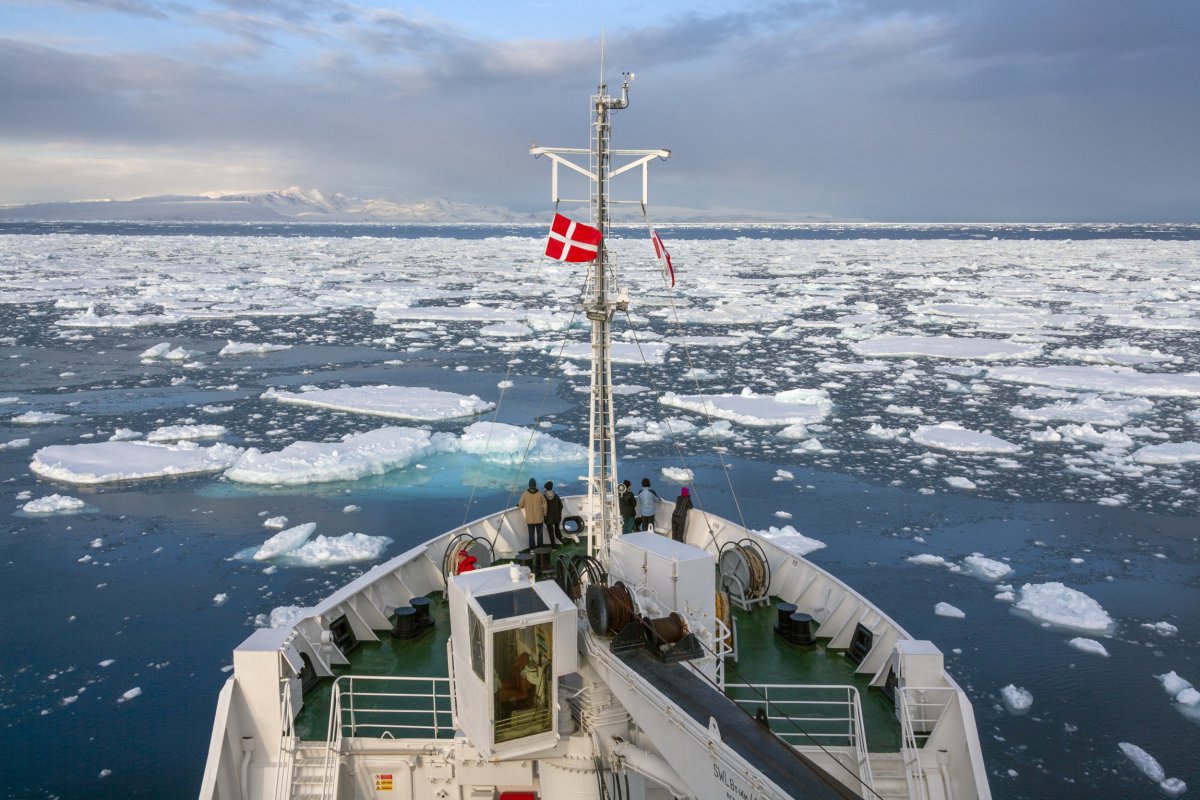The Arctic Ocean could see "ice-free" days within a matter of years—potentially a decade earlier than was previously predicted.
This is the warning of a team of researchers from the University of Colorado Boulder, who modeled the impact of climate change on future sea ice coverage in the northern ocean.
The main driver of sea ice loss, the team noted, is greenhouse gas emissions. However, the loss of ice cover creates a feedback loop, allowing the ocean to absorb more heat from sunlight, leading to more warming and ice melt in the Arctic.
It should be noted that the term "ice-free" is something of a misnomer here. Instead of meaning there is no ice at all in the Arctic, scientists use this to describe conditions when the ocean has less than 386,000 square miles of ice cover—around a fifth of the seasonal minimum back in the 1980s.
For comparison, recent years have seen the Arctic Ocean with a minimum sea ice cover in September of around 1,274,000 square miles, which is about a third of the area of the US.
The study was undertaken by Alexandra Jahn—a professor or atmospheric and ocean sciences at CU Boulder—and her colleagues.
"When it comes to communicating what scientists expect to happen in the Arctic, it is important to predict when we might observe the first ice-free conditions," Jahn said in a statement.
When they eventually arrive, she noted, ice-free conditions "will show up in the daily satellite data."
In their study, the team turned to both past studies and computer climate models to explore how day-to-day sea ice coverage is projected to change in the future.
The difference between the new study and its predecessors lies in how the team considered ice coverage on a daily basis, rather than looking at the monthly average.

By considering the ice coverage on a daily basis—rather than monthly, as with previous studies—the first "ice-free" day was predicted, on average, to occur four years earlier than previously anticipated.
Some models, however, predicted this threshold being crossed even earlier still—up to 18 years than scientists had previously projected.
In fact, under all greenhouse emissions scenarios, the team predicts that the Arctic Ocean will become ice-free for the first time on one day in late August or early September either this decade or next.
While this fate is inevitable, Jahn said that the frequency of "ice-free" days in the Arctic's future remains in flux, with such to be determined by future emissions levels.
The way things are presently going, the team expects that "ice-free" conditions will only end up arising in the period between August and October.

Under a higher emission scenario, however, the Arctic could end up "ice-free" for up to nine months a year come the end of the century.
"This would transform the Arctic into a completely different environment, from a white summer Arctic to a blue Arctic," Jahn said in the statement.
The loss of sea ice has significant impacts, both on those animals that need it for survival—like polar bears and seals—but also humans. Sea ice plays a key role in shielding the land from ocean waves, and its loss would lead to faster erosion.
Scientists also fear that a warming ocean could encourage an influx of non-native fish, with unknown impacts on the Arctic ecosystem.
"So, even if ice-free conditions are unavoidable, we still need to keep out emissions as low as possible to avoid prolonged ice-free conditions," said Jahn.
The good news, the researchers said, is that Arctic sea ice is a relatively resilient phenomenon—and such will quickly return if the atmosphere cools down again.
This is quite unlike the ice sheet in Greenland, Jahn noted in an example—which took thousands of years to build up.
She added: "Even if we melt all the Arctic sea ice, if we can then figure out how to take carbon dioxide back out of the atmosphere in the future to reverse warming, sea ice will come back within a decade."

Mika Rantanen — a climate researcher at the Finnish Meteorological Institute, in Helsinki — told Newsweek that the main messages of the study are "almost as important as, for example, the IPCC reports".
However, Rantanen said he is skeptical about the suggestion the first ice-free Arctic day could happen this decade.
"I think it is more likely to happen closer to the middle of the century, and close to the central estimates of the study," he added.
"I think there is growing evidence that natural climate variability has increased Arctic amplification over the past four decades.
"So it is expected that the same natural factors will work in the opposite direction in the coming decades, resulting in a slight weakening of Arctic warming."
There are already some signs of this, Rantanen said, as while 2023 was the warmest year on record globally, it was only the seventh warmest for the Arctic.
He concluded: "The melting of Arctic sea ice also shows currently no signs of accelerating. This year would mark 12 years since the last minimum record for summer sea ice extent, which occurred in September 2012."
The full findings of the study were published in the journal Nature Reviews Earth & Environment.
Do you have a tip on a science story that Newsweek should be covering? Do you have a question about climate change? Let us know via science@newsweek.com.
Update 05/03/24, 12:10 p.m. ET: This article was updated to include comment from professor Mika Rantanen.
Uncommon Knowledge
Newsweek is committed to challenging conventional wisdom and finding connections in the search for common ground.
Newsweek is committed to challenging conventional wisdom and finding connections in the search for common ground.
About the writer
Ian Randall is Newsweek's Deputy Science Editor, based in Royston, U.K. His focus is reporting on science and health. He ... Read more
To read how Newsweek uses AI as a newsroom tool, Click here.





